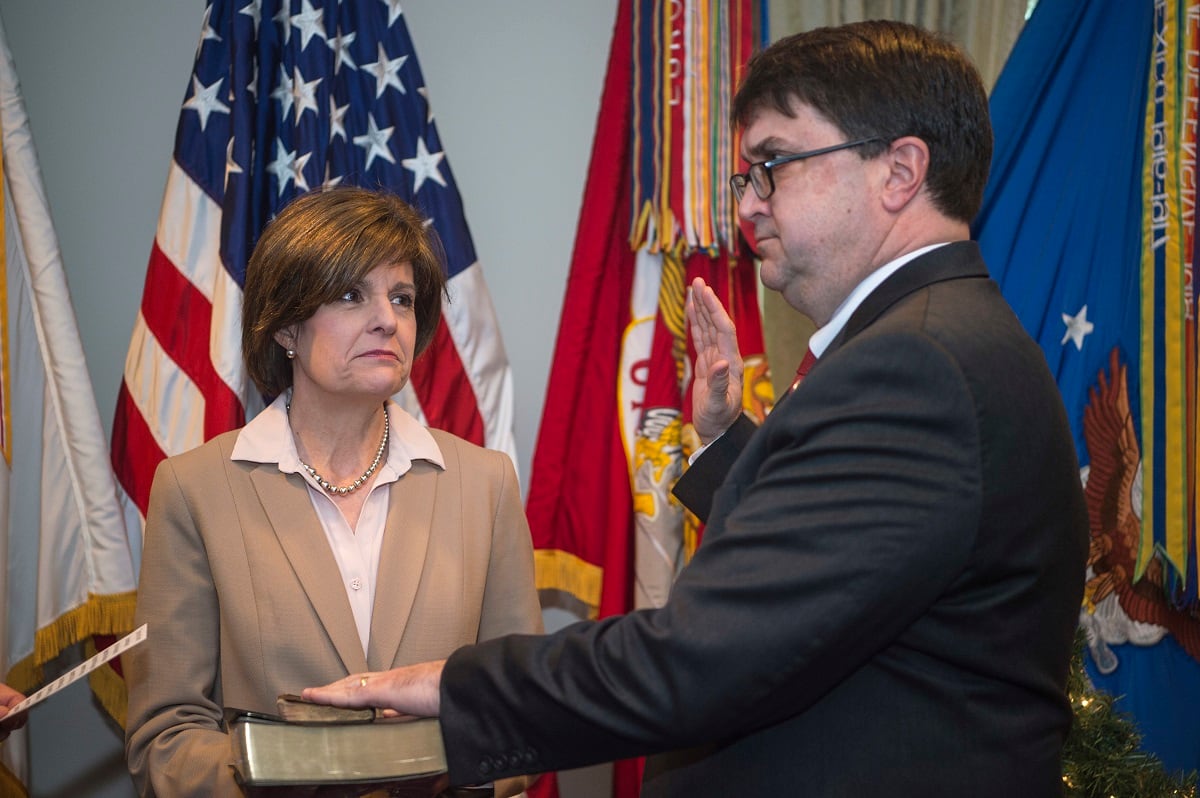WASHINGTON — Advocacy groups sued the White House on Monday to remove acting Veterans Affairs Secretary Robert Wilkie from that role, arguing his appointment violated federal law.
Wilkie, who also serves as the Defense Department’s under secretary for personnel and readiness, was named the acting head of VA last month when President Donald Trump dismissed then Secretary David Shulkin over Twitter.
But Wilkie’s appointment has raised concerns among multiple veterans groups, who have complained the role should have gone to Deputy Secretary Thomas Bowman, the next leader in line at the department. Like Shulkin, Bowman in recent months has sparred with White House officials on policy matters, but White House officials have not yet said whether he will lose his job.
The lawsuit, filed by the left-leaning VoteVets and executive branch watchdog Democracy Forward, charges that by bypassing Bowman, Trump violated the Federal Vacancies Reform Act along with other federal statutes.
“The president has to adhere to federal law before he can make an appointment,” said John Lewis, counsel for Democracy Forward. “He did not do that here.”
RELATED

At issue is whether Shulkin was officially fired or resigned last month. Under federal rules, the president can only go outside the normal chain of command to appoint a new acting secretary if the prior office holder “dies, resigns, or is otherwise unable to perform the functions and duties of the office.”
White House officials have said that Shulkin offered his resignation, opening the door to Wilkie’s appointment. Shulkin has insisted that he did not resign. Administration officials have not made public a resignation letter or other document to support their claim.
On Monday, White House and VA officials referred comment on the new lawsuit to the Justice Department. Officials there said they are reviewing the filing.
If successful, the lawsuit would not only remove Wilkie from office (replacing him with Bowman) but also invalidate any decisions or contracts he has authorized in his month at the post.
In a press release on April 25, VA spokesman Curt Cashour said following the firing of Shulkin, VA leadership is “now firmly aligned with President Trump and his priorities” and that “Under acting Secretary Wilkie’s leadership, senior VA officials are now on the same page, speaking with one voice to veterans, employees and outside stakeholders.”

But officials from VoteVets said they believe the move to put Wilkie in charge was designed to allow individuals within the administration to put forward a series of controversial reforms with less visibility, including plans to outsource more VA care to the private sector.
“Robert Wilkie never had hearings to examine his views of veterans’ care, or how he envisions the VA working,” said Will Fischer, director of government relations for the group.
“This flies in the face of the entire system of checks and balances that federal statutes and our Constitution call for. By bypassing Deputy Secretary Bowman, and illegally moving someone from another department over to the VA to act as interim secretary, we believe that the Trump administration is trying to get a head start on its privatization efforts for the department, before hearings on a new secretary even happen.”
A confirmation hearing on a permanent VA secretary was scheduled to take place last week, before allegations of unprofessional conduct arose regarding nominee Rear Adm. Ronny Jackson, the White House physician. He withdrew his name from consideration just days after Republicans and Democrats in the Senate agreed to postpone that hearing.
Trump has yet to name Jackson’s replacement, a delay which could leave Wilkie in the acting secretary role well into the summer.
The last acting VA secretary to serve more than a month in that role was Sloan Gibson, deputy secretary at the department when former VA Secretary Eric Shinseki resigned. He held the post for two months during the confirmation process for Robert McDonald, then returned to the deputy role.
Leo covers Congress, Veterans Affairs and the White House for Military Times. He has covered Washington, D.C. since 2004, focusing on military personnel and veterans policies. His work has earned numerous honors, including a 2009 Polk award, a 2010 National Headliner Award, the IAVA Leadership in Journalism award and the VFW News Media award.




